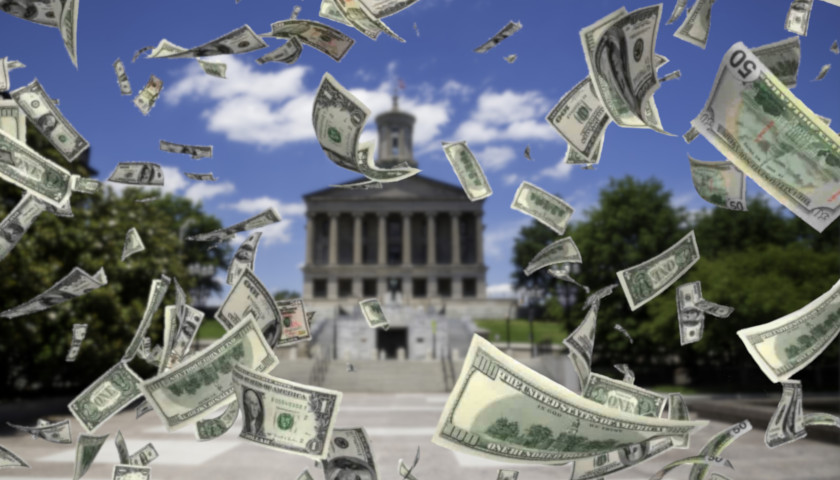The State of Tennessee finished the 2020-2021 fiscal year with a $3.1 billion surplus in revenues, as compared to the original budgeted estimates, Tennessee Department of Finance and Administration Commissioner Butch Eley reported Friday.
After adjusting for the increased revenue estimate of $1 billion recommended by the Funding Board in November 2020 that was passed by the General Assembly on April 29, Eley announced total tax receipts for fiscal year 2020-2021 are $2.1 billion more than the budgeted estimates.
July revenues were $1.5 billion against a budgeted $1.2 billion, resulting in a surplus of $287 million or 24 percent higher than the budgeted estimate for the month.
Despite the positive report, Eley noted that the growth rate compared to July 2020 was negative 21 percent. Eley explained that the decline was largely due to last year’s shifts in tax filing deadlines from April to July in consideration of business impact during the first few months of the pandemic.
A comparison of the tax growth of July 2021 to July 2019 is 25.7 percent, which, Eley said, “is more reflective of the economic activity.”
Meanwhile, Tennessee finishes the 2020-2021 fiscal year with a growth rate of 14 percent, which Eley called “remarkable” and equates to 21 percent over the budgeted estimate.
Here is how the major tax sources finished for the month of July and the 2020-2021 fiscal year.
- Sales and Use Tax – $246 million and 30 percent over budget for July; $1.9 billion and 20 percent over budget for the fiscal year
- Franchise and Excise Tax – $12 million and 14 percent over budget for July; $1.1 billion and 44 percent over budget for the fiscal year
- Privilege Tax – $14.9 million and 35 percent over budget for July; $114 million and 26 percent over budget for the fiscal year
- Income Tax – negative $151,000 and -16 percent for July; negative $22.4 million and -21 percent for the fiscal year
- Inheritance and Estate Tax – $0 budgeted and $15,000 revenues in July; $0 budgeted and $1.4 million for the fiscal year
- Gasoline Tax – $6.4 million and nine percent over budget for July; $2.3 million and 0.28 percent over budget for the fiscal year
- Motor Vehicle Fuel Tax – $1.5 million and five percent over budget for July; $328,000 and 0.11 percent over budget for the fiscal year
- Petroleum Special Tax – $355,000 and six percent over budget for July; negative $535,000 and -0.78 percent for the fiscal year
- Motor Vehicle Registration Tax – $2.4 million and eight percent over budget for July; $18.8 million and six percent over budget for the fiscal year
- Motor Vehicle Title Tax – $107,000 or five percent over budget for July; negative $756,000 and negative three percent for the fiscal year
- Tobacco Tax – $1.1 million and six percent over budget for July; $16.8 million and seven percent over budget for the fiscal year
- Beer Tax – $105,000 and six percent over budget for July; $1 million and six percent over budget for the fiscal year
- Mixed Drink Tax – $2 million and 16 percent over budget for July; negative $20 million and -15 percent for the fiscal year
- Alcoholic Beverage Tax – $881,000 and 13 percent over budget for July; $8.5 million and 11 percent over budget for the fiscal year
- Gross Receipts Tax – $645,000 and four percent over budget for July; $2.6 million and eight percent over budget for the fiscal year
- TVA Payment in Lieu of Taxes – negative $2.3 million and negative eight percent for July; negative $23 million and negative six percent for the fiscal year
- Severance Tax – $1,000 and two percent over budget for July; negative $552,000 and -55 percent for the fiscal year
- Coin-operated Amusement Tax – negative $74,000 and -66 percent for July; $6,000 and two percent over budget for the fiscal year
- Unauthorized Substance Tax – $0 budgeted amount and $0 revenues for July; $0 budgeted amount and $77,000 revenues for the fiscal year
The state’s three major funds all finished well ahead of the budgeted estimates for the fiscal year:
- General Fund – $3 billion and 24 percent
- Highway Fund – $22.7 million and two percent
- City and County Fund – $110 million and nearly nine percent
While the fiscal year ended on June 30, July is the final month of the 2020-2021 fiscal year on an accrual basis. Reported revenues, the announcement said, are subject to final adjustments that could impact cash amounts on an audited basis.
Despite the state’s phenomenal performance for the 2020-2021 fiscal year, Eley remained cautious.
“Even as the state finishes the year with a sizable balance, future growth remains a concern. Thus, we will continue to monitor national and global economic indicators to manage our spending and revenue collections appropriately.”
During the first session of the 112th General Assembly, members acknowledged that there would be a surplus in the state’s 2020-2021 fiscal year revenues.
An additional $1 billion in total funds to the current year’s original budgeted estimates was recognized as part of the fiscal year 2021-2022 budget, which legislators passed on April 29 as SB0912 with a Senate vote of 24-6 and a House vote of 76-11-3 largely along party lines.
The appropriations bill under Public Chapter 454 was signed on May 17 by Governor Bill Lee.
– – –
Laura Baigert is a senior reporter at The Star News Network, where she covers stories for The Tennessee Star, The Georgia Star News, The Ohio Star and The Arizona Sun Times.






Whoever does budget “estimates” needs to be fired.
Time to cut my taxes. But, of course, that will never happen. The bureaucrats will find a way to “need” every penny of it and continue to raise my taxes.